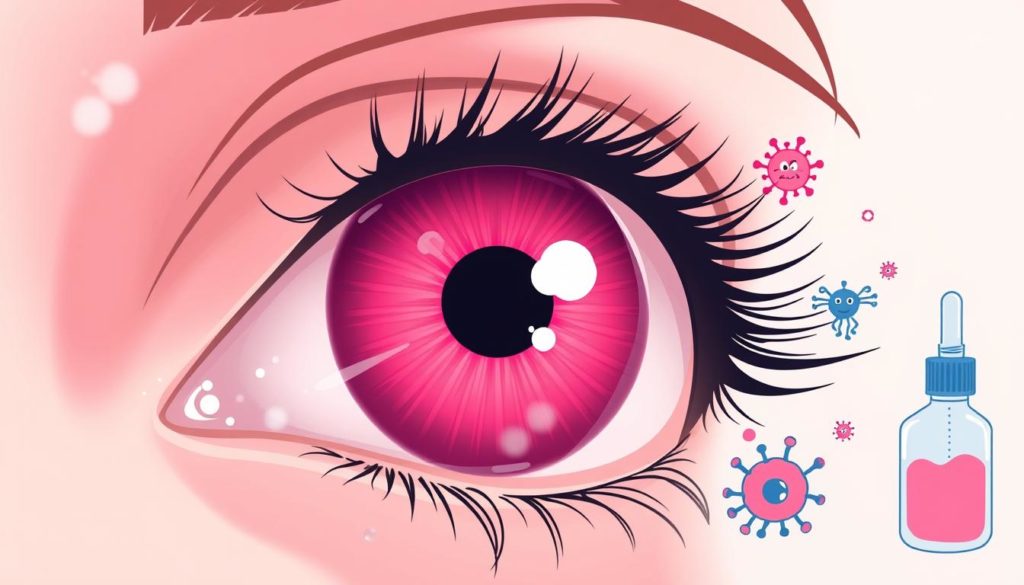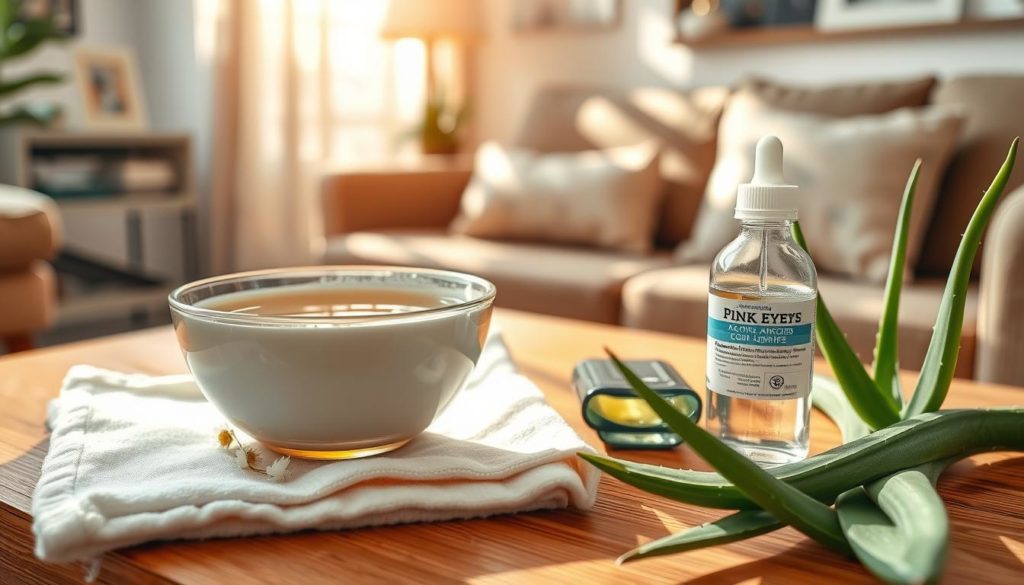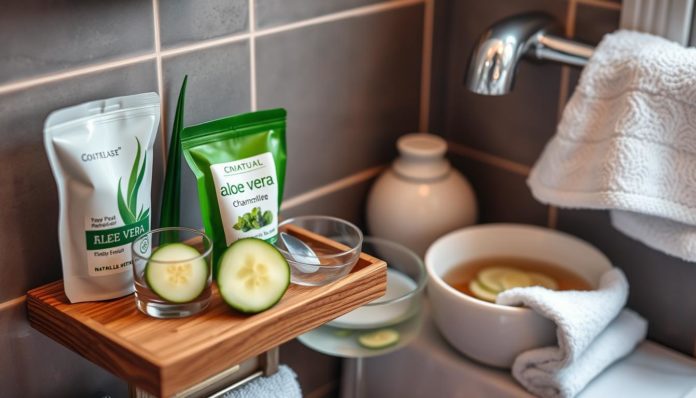About 6 million people in the US get pink eye each year. It can be worrying. However, there are home remedies for pink eye that aid in comfort and help heal faster.
You don’t always have to see a doctor right away. Knowing how to treat pink eye at home is useful. Cold packs and moisturizing eye drops are good starts. Keeping clean is also crucial. These steps are especially useful for mild cases from allergies or germs. Often, the best pink eye treatment begins at your house.
Still, knowing when to get medical help is key, particularly for babies or if things get worse. With quick and right steps, you can control pink eye well. And you can help prevent it from spreading to others.
Understanding Pink Eye: Causes and Symptoms
Conjunctivitis, also called pink eye, has many causes. Knowing the different pink eye causes is key. Identifying conjunctivitis symptoms helps find the best pink eye treatment.
Causes of Pink Eye
Pink eye comes from various sources, such as:
- Viral infections: Often get better alone in weeks.
- Bacterial infections: May need antibiotics to heal.
- Allergies: Avoiding allergens improves symptoms.
- Irritants: Smoke and chlorine can cause pink eye.

Common Symptoms of Pink Eye
It’s important to know pink eye symptoms for management. Key conjunctivitis symptoms are:
- Redness: Eyes turn very red.
- Itching: There’s an ongoing need to scratch.
- Discharge: Eyes might leak white or yellowish stuff.
- Swollen Eyelids: Eyelids could get puffy.
Knowing these symptoms helps get the right pink eye treatment on time.
Home Remedies for Pink Eye
Looking for home remedies for pink eye can make things better and help you heal faster. A common way to do this is by using compresses. Keeping things clean plays a big role in dealing with pink eye at home.

Using Compresses
Compresses are an easy but helpful way to treat pink eye at home. You can use cold or warm compresses, depending on what you need. Just make sure the cloth is clean and doesn’t leave fibers behind.
Applying Cold vs. Warm Compresses
Cold compresses are good for easing swelling and inflammation. Warm compresses, however, can loosen any mucus or dirt stuck in your eyes. Pick the type of compress based on what’s bothering you.
- Cold compress: Soothes inflammation
- Warm compress: Helps with mucus removal
Managing Hygiene
Good hygiene is key to take care of pink eye at home. You should wash your hands a lot, not touch your eyes, and change your pillowcases and towels often. Doing these things helps stop germs from spreading and is a natural way to fight pink eye.
Pink Eye Treatment with Over-the-Counter Medications
When facing pink eye, choosing the right over-the-counter meds is key. They can ease symptoms significantly. Over-the-counter treatments include various eye drops aimed at relief and healing.
Artificial Tears and Lubricating Drops
Artificial tears and lubricating drops can help a lot. They soothe irritation, cut down on dryness, and stop itching. It’s best to steer clear of drops that have vasoconstrictors, as these may make redness worse. Using them frequently during the day helps keep eyes comfy and moist.
Antihistamines and Mast Cell Stabilizers
For pink eye from allergies, antihistamines work well with mast cell stabilizers. These meds block chemicals that cause allergic reactions. They ease inflammation and halt the histamine response. This makes your eyes less itchy and red, offering relief from allergy-induced discomfort.
Natural Remedies for Pink Eye
Looking into natural ways to treat pink eye can offer comfort besides typical treatments. These remedies help lessen symptoms and swelling for those with conjunctivitis. Let’s look into some top herbal treatments for easing pink eye, the natural way.
Herbal Compresses
Using herbal compresses stands out as a well-liked natural fix. Teabags like chamomile, green tea, or black tea work well. They have natural ingredients that could reduce the inflammation and soreness pink eye causes.
Aloe Vera and Honey
There’s also the option of using aloe vera and honey. Aloe vera, famous for fighting inflammation, can be mixed with water for an eye wash. Honey, especially manuka honey, is known for its germ-fighting features and has been used to fight off conjunctivitis in various traditions.
| Natural Remedies | Properties | Application |
|---|---|---|
| Herbal Compresses | Anti-inflammatory | Compress |
| Aloe Vera | Anti-inflammatory | Eye rinse |
| Honey | Antimicrobial | Topical application |
When to Avoid Contact Lenses and Eye Makeup
If you get pink eye, you should not wear contact lenses or use eye makeup. This helps stop the infection from getting worse or spreading. Contact lenses and makeup can keep bacteria on them. Knowing the risks and what to do is key.
Risks Associated with Contact Lenses
Wearing contacts with pink eye is risky. If you get pink eye while wearing them, take them out right away. Keep using them can make your eye more infected and slow down healing. The lenses can hold bacteria close to your eye, which is bad.
You should wear glasses until your pink eye is totally gone. You must throw away the lenses and cases you used while sick. Using them again can make you sick once more.
Replacing Eye Makeup
Makeup can also be a problem when you have pink eye. Stop using makeup like mascara, eyeliner, and eye shadow right away. They can have bacteria on them, which might make you sick again.
After your pink eye is gone, you should get new makeup. This makes sure you start clean, without any bacteria from before.
Prescription Pink Eye Medication
If you have a tough case of pink eye, prescription pink eye medication can help a lot. These treatments are stronger than what you can buy over the counter. They really get to the heart of the problem.
Antibiotic Eye Drops
For the bacterial type, doctors often suggest antibiotic drops for conjunctivitis. These drops kill the bacteria behind the infection. They help ease symptoms like redness, goop in the eyes, and feeling irritated.
Antiviral Medications
When a virus, like herpes simplex or varicella zoster, causes pink eye, you need an antiviral treatment. Antivirals fight off viruses instead of bacteria. They stop the virus from spreading and help you get better faster.
Topical Corticosteroids
Topical corticosteroids are used for bad swelling from conjunctivitis. They are strong but need careful watching by a doctor. This is because of possible side effects, like higher eye pressure and cataracts.
It’s very important to follow your doctor’s orders for treating pink eye. Doing so helps you recover quickly and safely.
Preventing the Spread of Pink Eye
To prevent pink eye spread, it’s important to be very clean. Washing hands often with soap and water is key. Also, you should not touch your eyes to keep the infection from spreading.
Hygiene Practices
Using the right cleaning practices is vital in stopping pink eye. Make sure to wash your hands after using eye drops. Do not share things like towels, makeup, or pillowcases with others.
Laundry and Cleaning Protocols
Having good laundry habits is important too. Wash any linens, like pillowcases and towels, in hot water if used by someone sick. And don’t let others use them. Clean off any surfaces that might have been touched by the infected person.
Following these steps is important to stop pink eye from spreading. It helps keep everyone safe and healthy.
Protecting Newborns from Pink Eye
Newborn pink eye can come from infections passed at birth, blocked tear ducts, or irritants. Ensuring newborn pink eye safety is important. It includes preventive steps and fast treatment. In the U.S., hospitals often use antibiotic ointments right after birth.
Being proactive during pregnancy helps avoid pink eye in newborns. Expectant moms should talk to their doctors about any infections like genital herpes. This can cut down the risk of passing infections to the baby during birth. This step is key for newborn pink eye safety.
If a baby shows pink eye symptoms, getting medical help fast is key. The CDC says immediate care is needed. If not treated, conjunctivitis can cause serious problems like vision loss. Doctors often treat pink eye in babies with oral antibiotics.
| Type | Cause | Treatment |
|---|---|---|
| Chlamydial Conjunctivitis | Bacterial infection from mother | Oral antibiotics |
| Gonococcal Conjunctivitis | Bacterial infection from mother | Oral antibiotics and topical treatment |
| Chemical Conjunctivitis | Reaction to eye drops or ointments | Warm compresses and irrigation |
Parents should follow their pediatrician’s treatment plan closely. This ensures their baby recovers well and keeps their vision and health safe.
How to Deal with Allergic Conjunctivitis
Dealing with allergic conjunctivitis means finding out what causes it and treating symptoms properly. We’ll explore ways to lessen the impact of pink eye allergies.
Identifying Allergens
To treat allergic conjunctivitis, first identify pink eye allergens around you. Common allergens are pollen, pet dander, dust mites, and mold spores. Keep a diary of when your symptoms happen and what you’re exposed to. This helps you figure out what to avoid to lessen your symptoms.
Medications for Allergic Reactions
After finding out what triggers your allergies, look for medicines that can help. Doctors often suggest antihistamines and mast cell stabilizers. These drugs stop the body’s allergic responses. Also, anti-inflammatory medicines like decongestants or corticosteroids can reduce swelling and discomfort.
| Medication Type | Function | Examples |
|---|---|---|
| Antihistamines | Block histamines to reduce swelling and itching | Zyrtec, Claritin |
| Mast Cell Stabilizers | Prevent release of histamines | Patanol, Cromolyn |
| Decongestants | Reduce redness and swelling | Visine, Naphcon |
| Corticosteroids | Reduce severe inflammation | Prednisolone, Lotemax |
By using these pink eye allergy relief methods and managing allergens better, you can improve your symptoms and enjoy life more.
What to Do If Pink Eye Symptoms Worsen
Having trouble with pink eye can be worrying, particularly if it doesn’t get better or worsens. If simple remedies and store-bought meds don’t help, it’s time to think again and maybe get medical advice. It’s very important to know when you need to see a doctor for pink eye to stop more problems.
When to See a Doctor
You should see a doctor if your pink eye doesn’t get better after home care or gets worse. Look out for signs like really red eyes, a lot of pain, or vision changes. You should also act fast if you’re more sensitive to light or the symptoms last more than a few days without getting better.
For bacterial pink eye, if there’s no improvement within 24 hours after starting antibiotics, it’s time to seek more help. This is a clear sign that you might need additional treatment.
Signs of Severe Infection
Knowing the symptoms of bad conjunctivitis is key to getting help on time. Serious warning signs include lots of eye gunk, puffy eyelids, or fever with eye discomfort. Changes in sight and not liking bright lights also mean you should get a check-up soon.
By understanding these signs and acting when needed, you can deal with pink eye well. This makes a big difference in treating and overcoming this usual issue effectively.
FAQ
What are effective home remedies for pink eye?
Home remedies for pink eye are simple. Use cold compresses to lessen inflammation. Apply lubricating eye drops to ease dryness and itching. Good hygiene helps stop the infection from spreading.
Natural aids like herbal compresses, aloe vera, and honey can soothe. Yet, they must be used with care.
How can you identify the causes and symptoms of pink eye?
Pink eye may come from allergies, viruses, bacteria, or irritants. Watch for redness, itching, discharge, and swollen eyelids. Knowing these signs can guide the right treatment.
What is the best way to use compresses for pink eye?
Use cold compresses for soothing inflammation with pink eye. Warm compresses are good for clearing mucus. Always use a clean cloth. Be careful to prevent cross-contamination between eyes.
Which over-the-counter medications can provide relief for pink eye symptoms?
Lubricating artificial tears can lessen dryness and itching. For allergy-based pink eye, antihistamines and mast cell stabilizers help. They target chemicals that cause allergies.
Are there natural remedies for pink eye?
Sure, herbal compresses, aloe vera, and honey are natural remedies. They cut down on inflammation and ease pink eye symptoms. Still, check with a doctor to avoid eye irritation.
Should contact lenses and eye makeup be avoided during a pink eye infection?
Avoid contact lenses and eye makeup with pink eye. They can spread and worsen the infection. Replace any used products before the infection to lessen re-infection risk.
When is prescription medication necessary for pink eye?
Prescription meds are for serious cases. Bacterial infections may need antibiotic eye drops. Viral ones could require antiviral meds. Topical corticosteroids are for severe inflammation but use them carefully.
How can the spread of pink eye be prevented?
Stop pink eye from spreading with good hygiene. Wash hands often, avoid touching your eyes, and clean pillowcases and towels in hot water. Keeping clean lowers spreading the infection.
How can newborns be protected from pink eye?
Newborns risk pink eye from STIs during birth. Hospitals use antibiotic ointment as a precaution. If signs show up, get medical help fast to avoid big problems.
What are the steps to deal with allergic conjunctivitis?
Handle allergic conjunctivitis by steering clear of allergens. Use meds like antihistamines, mast cell stabilizers, and sometimes anti-inflammatory drugs. Decongestants or steroids may also help.
What should be done if pink eye symptoms worsen?
If pink eye gets worse, seek a doctor’s help. Look out for intense redness, pain, changes in vision, or no improvement after home care. Bacterial pink eye should get better within a day of antibiotics. If not, see a doctor.


